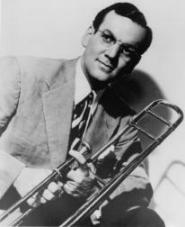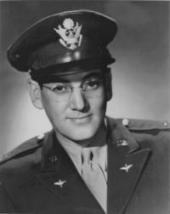The Glenn Miller Story
Glenn Miller's new swing style was first heard in public at the Raymor April 16, 1938, with an emphasis on reeds, especially clarinet leads that replaced the high notes of the trumpet. Miller's arrangements had a broad sweeping legato style, evident in the band's first hit song Little Brown Jug.
 Miller at the Yale Bowl
Miller at the Yale Bowl
|
His theme song Moonlight Serenade, written in 1935 and recorded for the RCA Bluebird label in 1939, became "America's 2nd national anthem" during the war years, according to Dave Garroway. Miller enlisted as an "instant Captain" in the Army Air Force in 1942 and developed a new military "superband" that marched to swing songs rather than marches. The band first played in the Yale Bowl July 28, 1943, with 2 string bass instruments riding on 2 jeeps. His band played for the AAF radio series "I Sustain the Wings" in 1943 and recorded 12-inch vinyl V-discs distributed to troops overseas. He was one of the most effective war bond salesmen, raising $4 million in 2 rallies in Chicago and St. Louis in 1943. It was at this time that he and Helen adopted their first baby Stevie. Miller wanted to play for the troops in England and overcame AAF opposition with the help of Ike aide Col. Ed Kirby who loved Miller's music. In May 1944 he received his assignment to take 62 musicians to England, where he played 71 concerts from June to November 1944. He was first stationed in "buzz bomb alley" at 25 Sloane Court where 90% of the German V1s passed over, adding a new sound to Miller's music. The band moved to Bedford in July to perform in a BBC studio for 13 radio shows per week. The band flew by airplane to perform at different bases, and Miller suffered from ringing in the ears due to the unpressurized cabins.
 Miller at the Yale Bowl
Miller at the Yale Bowl
|
Unfortunately, few of Miller's performances in England were recorded due to war shortages of metal used to make master discs. In November, the band moved to London to record V-discs and was almost hit by one the new V2 rockets while performing at the Mount Royal Hotel. Miller was planning a tour in France at the request of SHAEF when his plane was lost over the Channel Dec. 14-15, 1944. The log book of RAF navigator Fred Shaw recorded an entry for Dec. 14 "Ops. Siegen Canceled. Jettison Southern Area" after a bombing raid was aborted and his group dropped their 4,000 bombs over the English Channel so they could safely land. Shaw remembered seeing a small plane spiraling out of control and plunging into the water. However, Fred W. Atkinson, Jr. , argues that it was a negligent U.S. general who alllowed Miller's planes to fly in bad weather that caused the disappearance of Glenn Miller.
Production:
Released by Universal International Pictures in 1954, Technicolor, mono sound, 115 mins.
Directed by Anthony Mann
Produced by Aaron Rosenberg
Written by Valentine Davies and Oscar Brodney
Music by Glenn Miller
Music Adaptions by Henry Mancini
Cinematography by William H. Daniels
Film Editing by Russell F. Schoengarth
Art Direction by Alexander Golitzen and Bernard Herzbrun
Set Decoration by Russell A. Gausman and Julia Heron
Costume Design by Jay A. Morley Jr.
Color consultant William Fritzsche
Technical advisor Chummy MacGregor
Cast:
James Stewart as Glenn Miller
June Allyson as Helen Berger Miller
Harry Morgan as Chummy
Charles Drake as Don Haynes
George Tobias as Si Schribman
Barton MacLane as General Arnold
Sig Ruman as Kranz
Irving Bacon as Mr. Miller
James Bell as Mr. Burger
Kathleen Lockhart as Mrs. Miller
Katherine Warren as Mrs. Burger
Frances Langford as Frances Langford
Louis Armstrong as Himself
Ben Pollack as Himself
Gene Krupa as Himself
Barney Bigard as Himself
James Young as Himself
Marty Napoleon as Himself
Arvell Shaw as Himself
Cozy Cole as Himself
Babe Russin as Himself
Sources:
revised 11/15/02 by Schoenherr | Filmnotes

